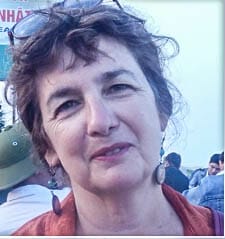Fighting 90’s heat and unhappy humidity, the Millennium Park crowd filled most of the chairs and lawn. Gershwin’s name as the top bill was likely what pulled so many out of their air-conditioned nests. Perhaps the forbidding heat wouldn’t have brought so many Chicagoans there if United Airlines hadn’t appropriated Gershwin’s music as their trademark sound lining paths to their O’Hare terminals.
The piano soloist Jeffrey Kahane, whom we learned at the pre-concert lecture has performed this work perhaps more than any other, certainly gave Gershwin his due. Sometimes bouncing on his chair, sometimes making the piano thunder and never missing a note or beat, we heard and saw his fingers fly over the keyboard with muscle-memory informed finesse.
For many in the audience the Gershwin opener expertly performed by soloist Jeffrey Kahane was the highlight of the evening. For this writer, however, Gershwin and father Kahane seem more like the very good warm up act for what followed -- emergency shelter intake form by Kahane’s composer/singer son Gabriel, creator of what one can presume is the world’s only symphonic work named for a bureaucratic form.
The title speaks to one of the libretto’s main foci—the check-all-that-apply intake form one needs to fill out to gain entrée to an overnight homeless shelter. Anyone who has felt the frustrations of fitting their person and situation into a multiple choice form will likely similarly find themselves initially hooked by this premise. Composer Kahane though does much more—especially by giving voice also to the many homeless who are not mentally ill or substance abusers, but jettisoned from their homes because of unexpected medical bills or similar personal catastrophes that they hadn’t planned on. High on this list of these causes for the unexpected slips into the abyss of homelessness are the subprime mortgages of recent financial collapse history that Composer Kahane manages to explicate in rhyming couplet style! (SPOILER ALERT!) Some might similarly find the sardonic wit of ode to NIMBY (Not in My Backyard) as woven from the same cloth as Phil Ochs’ Love Me I’m a Liberal as the even better pièce de resistance. The libretto in so many ways shouts Hey , this is about YOU too! -- on the one hand remarking at how financial ruin is just one medical bill away, and on the other hand, pointing out that the mortgage deduction of $750,000 that any homeowners in the audience are expecting when they sell is at the expense of the homeless.
Some in the audience might feel that this political exposition is piled on a bit too deep and high. This writer instead bristles at the report that Festival Director Kalmar didn’t get this commissioned in our city, the one allegedly of “make no small plans” traditions, but rather did so at his winter gig with the Oregon Symphony.
True to his generation’s acute sensibilities as to who is entitled to tell a story, Composer Kahane shared in the pre-performance lecture that he felt an urgency to involve people who have experienced homelessness in his work to imbue it with authenticity otherwise lacking. In this Chicago performance, that meant having the penultimate coda performed movingly by Harmony, Hope and Healing, a Chicago based non-profit that uses music as part of its support programs in the Cook County Jail, shelters and beyond. That these more real people voices--contrasted by the superb mezzo-soprano lead Alicia Hall Moran and the three person Chorus of Inconvenient Statistics (Composer Kahane, Holland Andrews and Holcombe Waller)—came to bear on what we heard, striking this writer as having artistic and ideological merit both.
(Editor’s Note: Stay tuned for a Picture this Post report on a similar focus on who-gets-to-tell-the-story by the up and coming filmmakers now creating 365 Ways to Kill an American, a film exploring the many incidents sparking and feeding the Black Lives Matter movement. )
Attendees of the afternoon rehearsal for this evening performance learned from the Grant Park Music Festival volunteer lecturer that father Jeffrey says “Everything that I do as a musician is shaped by the history of my family and my sense of its relation to history. My grandfather had been in a concentration camp, but it was not until I was an adult that I understood his experience … I know that I am blessed and have to speak out to similar kinds of oppression…”
Chicagoans who have been in the reach of the Marjorie Kovler Center for Survivors of Torture learn that much of the initial research on how families are impacted through the generations by torture is based on studies of descendants of Holocaust survivors. In the experience of this writer—who has known dozens impacted by the Holocaust and as a child growing up in NYC was exposed to countless more—the most notable families of Holocaust survivors are those where the experience supercharges the family generations’ shared passions for justice.
The Kahane family—father Jeffrey and son Gabriel-- seem to be from such a family, where social conscience seems to be a hand down from father to son as indisputable as a Y gene.
There is one more performance of this Kahane father and son double bill. Don’t miss it.
HIGHLY RECOMMENDED
When:
July 6, 2019
7:30 pm (pre-concert lecture 6:30 pm.
Where:
Pritzker Pavillion
Millennium Park
Chicago
Tickets:
Free!
For more information visit the Harmony, Hope and Healing website.
Read the related story, Grant Park Music Festival 2019 PREVIEW
All photos by Norman Timonera

About the Author: Amy Munice
Amy Munice is Editor-in-Chief and Co-Publisher of Picture This Post. She covers books, dance, film, theater, music, museums and travel. Prior to founding Picture This Post, Amy was a freelance writer and global PR specialist for decades—writing and ghostwriting thousands of articles and promotional communications on a wide range of technical and not-so-technical topics.






